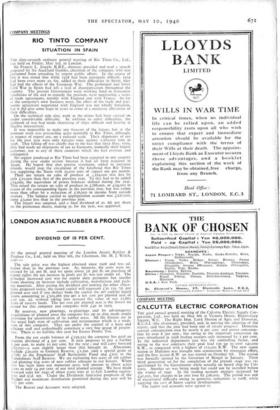COMPANY MEETINGS
RIO TINTO COMPANY
SITUATION IN SPAIN
THE sixty-seventh ordinary general meeting of Rio Tinto Co., Ltd., was held on Friday, May 3rd, in London.
Sir Francis L. Joseph, K.B.E., director, presided and read a speech prepared by Sir Auckland Geddes, chairman of the company, who was prevented from attending by urgent public affairs. In the course of this it was stated that while 1938 had been extremely difficult, 1939 had been even more so, for, added to their difficulties in Spain, they had had the effects of the European War. The prolonged and bitter Civil War in Spain had left a trail of disorganisation throughout the country. The present Government were working hard to reorganise conditions of life and to remedy the position, were negotiating a series of trade agreements, notably with England and with France. So far as the company's own business went, the effect of the trade and pay- ments agreement negotiated with England was not wholly fortunate, but it did give some hope in years to come of a moderate alleviation of their difficulties.
On the technical side also, work at the mines had been carried on under considerable difficulty. In addition to other difficulties, the outbreak of war had made chartering of ships difficult and loading at Huelva intermittent.
It was impossible to make any forecast of the future, but at the moment work was proceeding quite normally at Rio Tinto, although, in respect of export ore, on a reduced scale. Their shipments of ore for the past year were only 82o,000 tons, against 1,283,000 tons in 1938. That falling off was chiefly due to the fact that since May, 1939, they had made no shipments of ore to Germany, normally their largest customer, nor to any of those countries which she had overrun and subjugated.
No copper produced at Rio Tinto had been exported to any country during the year under review because it had all been required in Spain. He hoped that that precise statement, added to previous denials, would stop the circulation of the falsehood that Rio Tinto was supplying the Nazis with 35,000 tons of copper ore per month.
Their net return on sales of produce at £224000 was less by only £io,000 than that of the previous year. To this had to be added £64,000, the equivalent of peseta balances utilised during the year. This raised the return on sales of produce to £288,000, or £54,000 in excess of the corresponding figure in the previous year, but was rather more than offset by a reduction of £56,00o in income from outside sources. The balance carried to appropriation account was £227,000, some £5,000 less than in the previous year. The report was adopted, and a final dividend of 2s. 6d. per share on the preference shares, making 5s. for the year, was approved.






























 Previous page
Previous page